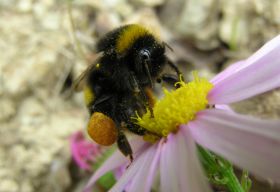Pesticides
A petition aiming for 100,000 signatures is calling for a greater blanket ban of neonics, while a bee species returns to Lincolnshire
Almost 90,000 people have signed a petition calling for the government to clamp down on the neonicotinoid ban following a ruling that allowed four counties to use limited amounts of the pesticide.

The petition, which wants a complete ban on neonics pesticides to be maintained and enforced by government, will be considered for parliamentary debate if it reaches 100,000 signatures by the closing date which is the end of January 2016.
Three neonics were banned for two years for use on flowering crops in December 2013, following concerns over harmful effects on pollinators.
Farming bodies and other agriculture stakeholders disputed the decision, and this year Defra allowed four counties to use neonicotinoid-treated rape seed following lobbying from the NFU.
The petition is named ‘Don’t kill our bees! Immediately halt the use of neonicotinoids on crops’ and argues that neonics should be banned because they are harmful to pollinators.
The news comes as the Andrena Nitida bee species was spotted in Lincolnshire, after not being seen in the area since 1900.
It was found on a new Syngenta Operation Pollinator habitat area, created by Beeswax Farming, which is owned by hoover tycoon Sir James Dyson.
Bee entomology specialist Mike Edwards described the find as “very encouraging”. “It is very encouraging that habitat creation on farmland is helping some of these solitary bee species to recover in numbers, and to extend their range across the UK,” he said.
“Andrena nitida is one of the many solitary mining bee species that play such an important part in pollinating crops and wildflowers. They look very much like honeybees. However, their behaviour on flowers, and the fact they carry large amounts of dry pollen as they fly from flower to flower, makes them extremely efficient pollinators.”
Plans for a fresh produce-specific centre turned down by Innovate UK, but industry invited to take part in wider agricultural bid
The future of fresh produce research has been dealt a blow after plans for a Fresh and Prepared Produce Innovation Centre were rejected.

Innovate UK – the new name for the Technology Strategy Board – turned down proposals for the new centre, which would have highlighted major challenges facing the sector, including increasingly restrictive regulatory controls on the use of pesticides and other inputs, consumers’ demands and unpredictable weather conditions.
Innovate UK is investing £200m in new technology and innovation centres, but the body decided not to fund a fresh produce-specific centre.
Instead the Horticulture Innovation Partnership (HIP), which co-ordinated the bid and expressed its disappointment at the outcome, said it has been invited to represent the sector at a collaboration event on January 15th organised by Innovate UK to build consortia for the Centres for Agricultural Innovation.
“We are encouraged by this and will take a full and active part in the consortia building event,” said HIP chair Mary Bosley.
“The HIP’s priority remains, as we have always stated, to make sure that the fresh produce sector is positioned to take best advantage of whatever landscape of innovation centres are eventually funded, while taking account of the industry’s identified needs,” Bosley added.